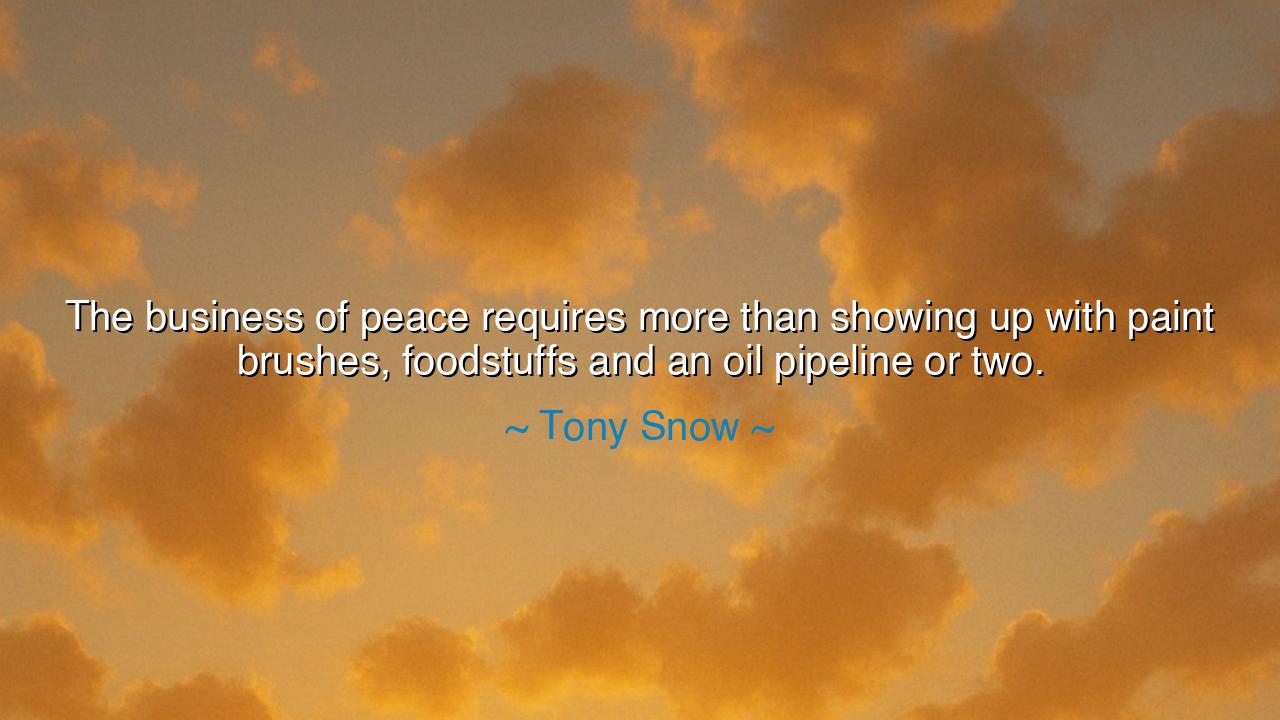
The business of peace requires more than showing up with paint
The business of peace requires more than showing up with paint brushes, foodstuffs and an oil pipeline or two.






Hear the solemn words of Tony Snow, who proclaimed: “The business of peace requires more than showing up with paint brushes, foodstuffs and an oil pipeline or two.” This is not the idle remark of a cynic, but the cry of one who knew the struggles of nations and the failures of easy answers. For too often, men believe that peace can be purchased with gifts, supplied with commodities, or painted upon the surface of broken walls. Yet true peace is not a shallow decoration, nor the result of material offerings alone—it is a deeper work, a business of the spirit and of justice, requiring sacrifice, patience, and truth.
Mark this well, O seeker: peace is not charity, but covenant. To deliver food without addressing hunger’s root, to offer goods without securing dignity, to build pipelines without building trust—these are gestures that soothe for a moment but leave the wound festering beneath. Snow reminds us that peace requires not only hands that give, but hearts that understand, and leaders who dare to heal divisions at their root. Without justice, mercy is fragile; without truth, reconciliation is hollow.
Consider the tale of post-war Europe after the Second World War. When the guns grew silent, the continent lay in ashes, torn not only by destruction but by bitterness. It was not enough to rebuild roads and feed the hungry. The nations needed something greater—the Marshall Plan, which sought not only to provide food and supplies, but to restore dignity, rebuild trust, and create partnerships that endured. This plan, born not of shallow gifts but of deep strategy and shared purpose, became the soil in which peace was planted. It was proof that true peace requires structure, vision, and commitment, not token gestures.
Reflect also on the struggles of nations where aid has been given without healing justice. How often has food arrived, yet corruption devoured it? How often have supplies been delivered, yet violence still ruled the streets? These failures remind us that peace is not secured by things alone, but by the transformation of relationships—between rulers and people, between tribes and nations, between hearts long divided by grievance. Paint and pipelines cannot erase mistrust; only justice, forgiveness, and fairness can.
And so, O children of wisdom, we must understand that the business of peace is harder than the business of war. War is quick, filled with fire and fury, but peace is slow, demanding patience, compromise, and humility. War destroys in days; peace is built in generations. Snow’s words remind us not to be seduced by the illusion of easy peace, but to labor for the lasting kind, built upon the rock of truth and not the sand of shallow aid.
The lesson for us is clear: in our homes, in our workplaces, in our nations, do not think peace is made by offering gifts alone. If there is strife, do not silence it with mere tokens, but seek its cause. If there is division, do not plaster it over with false smiles, but labor to understand, to forgive, to reconcile. For true peace is not a covering, but a healing—it demands honesty, sacrifice, and the courage to rebuild foundations.
Therefore, let these words guide you: when you seek peace, bring more than offerings. Bring listening, bring humility, bring justice. Be willing not only to give what is easy, but to repair what is broken. In doing so, you will not only ease the suffering of today but build the harmony of tomorrow. For as Snow has taught, the business of peace is not cheap, not simple, but sacred—and it requires from each of us the labor of both hand and heart.






AAdministratorAdministrator
Welcome, honored guests. Please leave a comment, we will respond soon